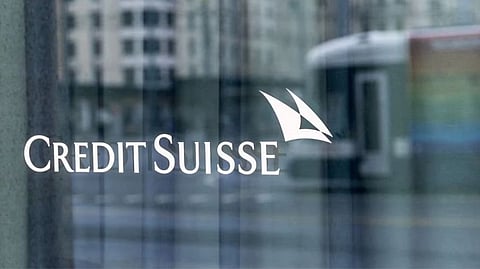

LONDON: Futures and Asian stocks fought to stablise though banks remained under pressure on Monday as a rescue deal for Credit Suisse and a concerted effort by central banks to restore confidence eased immediate fears of contagion.
European futures rose 0.5% and S&P 500 futures rose 0.4% in bumpy trade. FTSE futures rose 0.3%. In cash trading a bounce for banks in Tokyo retraced and most markets in Asia lost ground. MSCI's broadest index of Asia-Pacific shares outside Japan fell 0.6%.
While the volatility has subsided for now, investors remained fearful about what could happen next after a week in which a systemic lender in one of Europe's financial capitals was brought to its knees by the turmoil in the bond market resulting from the collapse of Silicon Valley Bank. Over the weekend, UBS said it will buy Credit Suisse for 3 billion francs ($3.2 billion) and assume up to $5.4 billion in losses, a shotgun merger engineered by Swiss authorities that investors hope can head off an even bigger mess in global markets.
"The market's taken a positive view that that's one area of concern that's been cauterized," said Jason Wong, a senior strategist at BNZ in Wellington. "But it doesn't solve the U.S.-banking specific issues, where deposits are going out the door into safer banks," he said.
"We've got to get confidence back into that banking sector, and probably more needs to be done or a week from now we'll still be facing the same sorts of issues." Central banks including the U.S. Federal Reserve, the European Central Bank and Bank of Japan on Sunday pledged support for market liquidity by increasing the frequency of seven-day U.S. dollar-swap operations from weekly to daily.
The BOJ said there were no bids for dollars during its operation on Monday, potentially a positive sign if it signals there isn't urgent demand. The central banks' assurances were enough to steady selling without reversing it.
Japan's Nikkei fell 0.4% and the Hang Seng fell 0.9%, with Hong Kong financials down 1%. Financials in Australia fell 0.7%. U.S. Treasuries were sold too, to wind back some of last week's wild rally. Dealers said the outlook remains clouded by the fragility of banking confidence.
STABILITY RISKS Investors still face a situation that remains unnerving on several counts.
Firstly, authorities efforts to calm things down haven't been entirely successful yet and have also drawn attention to the scale of problems. Banks sought record amounts of emergency liquidity from the Federal Reserve last week and depositors seem skittish.
Secondly, Credit Suisse shareholders have taken heavy losses and some bondholders appear to be left with nothing after the bank said some 16 billion francs in debt will be written down to zero - raising risks for exposure to banks everywhere. "Investors are trying to price out stability risks, but also having to process having their assets written down to save depositors," said Damien Boey, chief equity strategist at Sydney-based investment bank Barrenjoey.
"The key question is whether solvency or liquidity concerns are sufficiently addressed by bailout/merger attempts to make deposit runs stop. The answer isn't clear yet." One positive on Monday were yen cross-currency swaps , a measure of non-U.S. investor demand for dollars. They shrank to minus 35 basis points or half their levels last week, in a hint of some respite in market funding conditions.
Benchmark 10-year Treasury yields rose nine basis points to 3.49%. Two-year yields rose 10 bps to 3.94%. U.S. interest rate futures were bouncing around, and by mid morning in Hong Kong had pared half their early losses. Ahead of a Federal Reserve meeting on Wednesday, markets were pricing about a 60% chance of a 25 bp rate hike before embarkibng on a series steady rate cuts as early as June.
Rates pricing is likely to remain volatile while there is concern over regional banks in the United States. A U.S. official said on Sunday that deposit outflows had slowed and in some cases reversed. But first First Republic also had its credit rating pushed deeper into junk status by S&P Global and elsewhere efforts to raise capital were hitting difficulties.
Visit news.dtnext.in to explore our interactive epaper!
Download the DT Next app for more exciting features!
Click here for iOS
Click here for Android